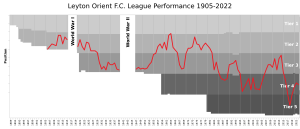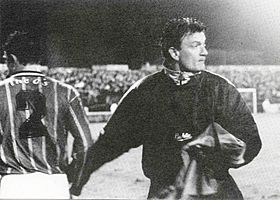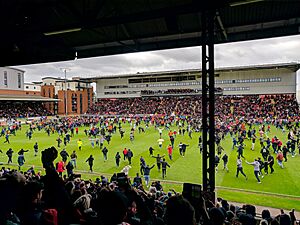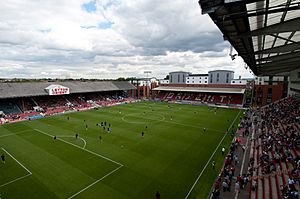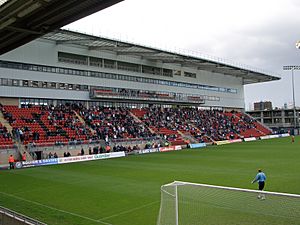Leyton Orient F.C. facts for kids
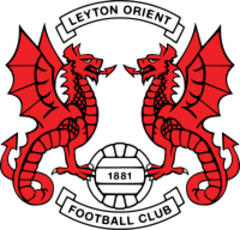 |
||||
| Full name | Leyton Orient Football Club | |||
|---|---|---|---|---|
| Nickname(s) | The O's | |||
| Founded | 1881 | |||
| Ground | Brisbane Road | |||
| Capacity | 9,271 | |||
| Chairman | Nigel Travis | |||
| Head coach | Richie Wellens | |||
| League | League Two | |||
| 2018–19 | National League, 1st of 24 (promoted) | |||
|
||||
Leyton Orient Football Club, often called "Orient" or "the O's," is a professional football team from Leyton, London, England. They play in EFL League One, which is the third level of English football.
The club started in 1881 as the Glyn Cricket Club. They began playing football as Orient in 1888. They joined the London League in 1896. In 1898, they changed their name to Clapton Orient and joined the Football League in 1905.
After World War II, the club became Leyton Orient. They won the Third Division South title in 1955–56. They were promoted to the Second Division in 1961–62. They played one season in the top league, the First Division, before being relegated. In 1966, they changed their name back to Orient F.C. They won the Third Division in 1969–70.
During the 1970s, Orient played in the second tier. They won two London Challenge Cups and reached the 1977–78 FA Cup semi-finals. In 1987, the club became Leyton Orient again. They won promotion from the Fourth Division in 1988–89.
In 2005–06, under manager Martin Ling, Orient were promoted to League One. After some difficult years, including dropping out of the Football League for the first time in 112 years, Nigel Travis took over in 2017. Under manager Justin Edinburgh, the club returned to the Football League in 2018–19 as champions of the National League. Most recently, under manager Richie Wellens, Leyton Orient won the League Two title in 2022–23.
Leyton Orient is the second oldest professional football club in London. Their home colors are all red. They have played their home matches at Brisbane Road since 1937.
Contents
Club History
Leyton Orient has a long and interesting history, with many name changes and exciting moments.
Early Years and Name Changes (1881–1914)
The club began in 1881 as the Glyn Cricket Club. Many players were students from a nearby college. The team changed its name several times. In 1886, they were the Eagle Cricket Club. In 1888, they became Orient Football Club.
The name "Orient" might have come from a player, Jack R Dearing, who worked for the Orient Steam Navigation Company. In 1898, the club changed its name to Clapton Orient to show where they played. They joined the Football League in 1905.
After World War II, the club moved to Leyton and became Leyton Orient. In 1966, they changed back to just Orient F.C. This happened after some financial difficulties. In 1987, the club returned to being Leyton Orient again. This was after fans campaigned to bring the "Leyton" part of the name back.
Football During the World Wars (1914–1955)
The 1914–15 season was the last before World War I stopped league football. A large number of Clapton Orient players and staff, 41 in total, joined the army. This was the most from any football team in the country. They were part of the "Footballers' Battalion."
During the Battle of the Somme, three Orient players, Richard McFadden, George Scott, and William Jonas, sadly lost their lives. Many other players were injured and could not play football again. Before the war, Richard McFadden was known for being a hero. He saved two boys from drowning and rescued a girl from a house fire!
In 1921, a special event happened. The Prince of Wales (who later became King Edward VIII) visited the O's stadium. This was the first time a member of the royal family attended a Football League match. It showed thanks for Clapton Orient's bravery during the war.
Mid-Century Success and Challenges (1955–2001)
Leyton Orient won the Division Three South championship in 1955–56. They spent many years in the Second Division. In the 1961–62 season, Orient reached the top league in English football, the First Division, for the only time in their history. They were managed by Johnny Carey. They only stayed for one season but famously beat local rivals West Ham United at home.
They won the Division Three championship again in 1969–70. The 1970s were a good time for the club. In 1972, they had a famous FA Cup win, coming back from 2–0 down to beat Chelsea 3–2. In 1978, Orient reached the semi-finals of the FA Cup, their best ever run in that competition.
In the 1980s, Orient faced more challenges and dropped to the fourth tier of English football. However, they ended the decade well. In 1988–89, they won promotion from Division Four through the play-offs.
In 1995, Barry Hearn became chairman. This period was even shown in a TV documentary called Orient: Club for a Fiver. Under manager Tommy Taylor, Orient reached the play-off finals in 1999 and 2001 but lost both times. In the 2001 final, Orient's Chris Tate scored a goal after just 27 seconds, which was the fastest ever in a play-off final at the Millennium Stadium!
Promotions and New Ownership (2001–2017)
After the 2001 play-off defeat, it took a few years for Orient to recover. In October 2003, former player Martin Ling became manager. After steady improvement, Leyton Orient won automatic promotion to League One in the 2005–06 season. This was their first automatic promotion in 36 years. They also had a great FA Cup run, beating Premiership side Fulham. Promotion was secured on the very last day of the season with a late goal by Lee Steele.
The 2013–14 season was also successful. Orient finished third in the league and reached the play-offs. They made it to the final at Wembley but lost in a penalty shoot-out to Rotherham United.
In 2014, Italian businessman Francesco Becchetti took over the club. This led to a difficult period. The club had many different managers and faced financial problems. In 2017, Orient were relegated to the National League, leaving the Football League for the first time in 112 years. Fans protested against the ownership. On June 22, 2017, Nigel Travis bought the club.
Return to the Football League (2017–Present)
After a tough start in the National League, Justin Edinburgh became manager in November 2017. Under his leadership, the club improved greatly. On April 27, 2019, Orient won the National League title, securing their return to the Football League after two years. They also reached the FA Trophy final but lost.
Sadly, Justin Edinburgh passed away in June 2019. His assistant, Ross Embleton, took over. The club finished 17th in their first season back in League Two. During the COVID-19 pandemic, the club furloughed players and staff to help with finances. For the 2020–21 season, former loanee Harry Kane sponsored Orient's shirts. He used the space to thank key workers and support charities like Haven House Children's Hospice and Mind.
In February 2022, Richie Wellens became manager. He helped the club avoid relegation. The 2022–23 season was fantastic! Orient were promoted back to League One on April 18, 2023, after eight years away. They then won the League Two title four days later. In the 2023-24 season, they finished 11th in League One, securing their place for another year.
On April 25, 2025, a group led by New York businessman David Gandler took full ownership of the club. Gandler is now the main shareholder.
Club Badge and Kit
Orient's club badge features two wyverns facing each other over a football. A wyvern is a mythical creature, like a dragon. This symbol was added in 1976. It is thought to represent Orient's connections to the City of London and the sea. The wyvern on the badge inspired the club's mascot, Theo, whose name comes from "the O's." Theo first appeared in the 2000–01 season.
In the past, the club's badges included the Leyton Borough coat of arms and a single red dragon. The team's home kit colors are always red.
Shirt Sponsors
Over the years, Leyton Orient has had various shirt sponsors. These have included companies like Samsung, FIFA, and Rainham Steel. From 2018 to 2019, The Sun's Dream Team was the main sponsor. As mentioned, from 2020 to 2023, Harry Kane sponsored the shirts to support charities and thank key workers. In November 2020, the British YouTube group Sidemen also sponsored the club. For the 2023/24 season, investment bankers Eastdil Secured were the main shirt sponsor.
Club Stadiums
Leyton Orient has played at several different grounds throughout its history.
Millfields
Orient's first ground was at Glyn Road. Then, from 1896 to 1930, they played at Whittle's Athletic Ground, also known as Millfields. This ground could hold over 35,000 people and was quite modern. However, Orient was only a tenant and faced high rents. So, they moved to a new ground.
Lea Bridge Road
In 1930, Clapton Orient moved to Lea Bridge Stadium. Their first match there was a 3–1 win against Newport County. However, the ground had some issues. The Football League even closed it for repairs because a wooden fence was too close to the playing area. Orient had to play some home games at Wembley Stadium and Arsenal Stadium. The club was not happy with Lea Bridge Road and decided to move again in 1937.
Brisbane Road
Brisbane Road has been Orient's home since 1937. It has changed a lot over the years. It used to have only one small stand and cinder banks for standing fans. Over time, more stands were built and improved.
In the late 1990s, the club started to redevelop Brisbane Road into an all-seater stadium. The new South Stand opened in 1999. The West Stand was completed in 2005. It has seating, corporate boxes, and club offices.
The North Stand, which is now the Family Stand, was finished before the 2007–08 season. This gave Orient a stadium with four sides and a capacity of 9,271. In 2013–14, the East Stand was modernized, and black seats were added to spell out "The O's."
In 2008–09, the South Stand was renamed the 'Tommy Johnston Stand' to honor Orient's top goal scorer. On January 25, 2022, the West Stand was renamed the 'Justin Edinburgh Stand' to remember the late manager who led the club back to the Football League.
Olympic Stadium Proposal
In 2011, Leyton Orient wanted to become tenants of the London 2012 Olympic Stadium. They even suggested sharing the stadium with West Ham United. However, West Ham was chosen as the main tenant in 2012. Orient's chairman, Barry Hearn, was concerned that the stadium was too close to Brisbane Road and could cause financial problems for the club. Eventually, Orient ended their legal challenge after reaching an agreement with the Premier League.
Club Supporters
Leyton Orient has a strong fan base, mostly in East London.
The Supporters Club and the Leyton Orient Fans Trust are official groups that represent the fans. These groups often meet with the club's management. Fans have also organized protests in the past when they were unhappy with the club's ownership. These protests helped bring attention to the club's situation.
Some famous fans of Leyton Orient include comedian Bob Mills, actor Daniel Mays, and composer Andrew Lloyd Webber. Andrew Lloyd Webber even wrote an album called Variations because he lost a bet to his brother, Julian, about a Leyton Orient match!
Club Rivalries
Orient has several rivalries with other football clubs.
Their main rival is Southend United. Matches between them are called the A13 derby. This rivalry grew because Southend was Orient's closest league rival for a period.
Other local rivals include West Ham United, Millwall, Brentford, Dagenham & Redbridge, Colchester United, Cambridge United, and Barnet.
Historically, they also had rivalries with former local clubs like Leyton, Leytonstone, and Walthamstow Avenue.
Current Players
First Team Squad
|
|
Under-18 Squad
|
|
Club Management and Staff
Here are the people who help run Leyton Orient Football Club:
Boardroom Staff
| Position | Name |
|---|---|
| Chairman | Nigel Travis |
| Vice Chairman | Kent Teague |
| Directors |
|
| Chief Executive Officer | Mark Devlin |
Coaching Positions
| Position | Name |
|---|---|
| Director of football | Martin Ling |
| Head coach | Richie Wellens |
| Assistant head coach | Paul Terry |
| First team coach | Alan McCormack |
| Goalkeeping coach | Simon Royce |
| First team performance analyst | Charlie George |
| Physical performance coach | Jack Manuel |
| Head physiotherapist | Ketan Patel |
| Sports therapist | Melvin Hancock |
| Sports scientist | Jack Manuel |
| PDP/U21 head coach | Darren Pratley |
| Academy manager | Mel Jeffries |
| U18 head coach | Mark Timmington |
| Club doctors | Carl Waldmann |
| Kit manager | Adrian Martin |
| Chief scout | Steve Foster |
Club Records
- Best FA Cup performance: Semi-finals, 1977–78
- Best League Cup performance: Fifth round, 1962–63
- Best League Trophy performance: Southern Area finalists, 1994–95, 2012–13
- Biggest victory: 8–0 vs. Crystal Palace, Division 3 South 12 November 1955; 8–0 vs. Rochdale, Division 4 14 October 1987; 8–0 vs. Colchester United, Division 4 15 October 1988; 8–0 vs. Doncaster Rovers, Division 3 28 December 1997
- Most goals scored in a match: 9–2 vs. Aldershot, Division 3 South 10 February 1934; 9–2 vs. Chester City, League Cup 17 October 1962
- Biggest defeat: 0–8 vs. Aston Villa, FA Cup 4th round 30 January 1929
- Biggest league defeat: 1–7 vs. Torquay United, Division 3 South 16 April 1949; 1–7 vs. Notts County, Division 3 South 1 October 1949; 1–7 vs. Stoke City, Division 2 22 September 1956
- Highest attendance: 38,219 vs. Tottenham Hotspur Division 2 16 March 1929
- Most capped international player: 22 – Jobi McAnuff (Jamaica) (32 in total)
- Most league goals in a season: 35 – Tommy Johnston 1957–58, Division 2
- Most league goals in total: 121 – Tommy Johnston, 1956–58, 1959–61
- Highest transfer fee received: £1,500,000 – Ethan Galbraith to Swansea City, July 2025
- Highest transfer fee paid: £300,000 – Idris El Mizouni from Oxford United, July 2025
- The fastest recorded goal in a play-off final: Chris Tate, May 2001 vs. Blackpool – 27 seconds
Club Honours
Here are some of the titles and achievements Leyton Orient has won:
League Titles
- Second Division (level 2)
- Runners-up: 1961–62
- Third Division South / Third Division (level 3)
- Champions: 1955–56, 1969–70
- Fourth Division / League Two (level 4)
- Champions: 2022–23
- Promoted: 2005–06
- Play-off winners: 1989
- National League (level 5)
- Champions: 2018–19
Cup Competitions
- FA Trophy
- Runners-up: 2018–19
- Anglo-Scottish Cup
- Runners-up: 1976–77
- London Challenge Cup
- Winners: 1912, 1972, 1973, 1993
- Dubonnet Cup
- Winners: 1911
See also
 In Spanish: Leyton Orient Football Club para niños
In Spanish: Leyton Orient Football Club para niños
 | Frances Mary Albrier |
 | Whitney Young |
 | Muhammad Ali |


